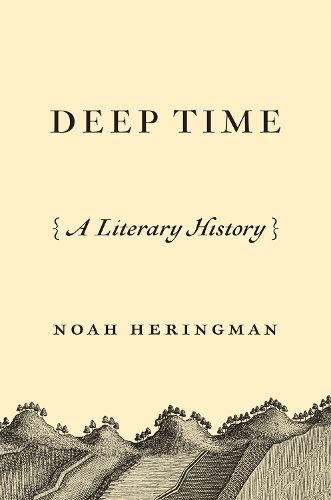Readings Newsletter
Become a Readings Member to make your shopping experience even easier.
Sign in or sign up for free!
You’re not far away from qualifying for FREE standard shipping within Australia
You’ve qualified for FREE standard shipping within Australia
The cart is loading…






How the concept of deep time began as a metaphor used by philosophers, poets, and naturalists in the eighteenth and nineteenth centuries
In this interdisciplinary book, Noah Heringman argues that the concept of deep time -most often associated with geological epochs-began as a metaphorical language used by philosophers, poets, and naturalists of the eighteenth and nineteenth centuries to explore the origins of life beyond the written record. Their ideas about the abyss of time created a way to think about the prehistoric before it was possible to assign dates to the fossil record. Heringman, examining stories about the deep past by visionary thinkers ranging from William Blake to Charles Darwin, challenges the conventional wisdom that the idea of deep time came forth fully formed from the modern science of geology. Instead, he argues, it has a rich imaginative history.
Heringman considers Johann Reinhold Forster and Georg Forster, naturalists on James Cook’s second voyage around the world, who, inspired by encounters with Pacific islanders, connected the scale of geological time to human origins and cultural evolution; Georges-Louis Leclerc, Comte de Buffon, who drew on travel narrative, antiquarian works, and his own fieldwork to lay out the first modern geological timescale; Blake and Johann Gottfried Herder, who used the language of fossils and artifacts to promote ancient ballads and prehistoric song ; and Darwin’s exploration of the reciprocal effects of geological and human time. Deep time, Heringman shows, has figural and imaginative dimensions beyond its geological meaning.
$9.00 standard shipping within Australia
FREE standard shipping within Australia for orders over $100.00
Express & International shipping calculated at checkout
How the concept of deep time began as a metaphor used by philosophers, poets, and naturalists in the eighteenth and nineteenth centuries
In this interdisciplinary book, Noah Heringman argues that the concept of deep time -most often associated with geological epochs-began as a metaphorical language used by philosophers, poets, and naturalists of the eighteenth and nineteenth centuries to explore the origins of life beyond the written record. Their ideas about the abyss of time created a way to think about the prehistoric before it was possible to assign dates to the fossil record. Heringman, examining stories about the deep past by visionary thinkers ranging from William Blake to Charles Darwin, challenges the conventional wisdom that the idea of deep time came forth fully formed from the modern science of geology. Instead, he argues, it has a rich imaginative history.
Heringman considers Johann Reinhold Forster and Georg Forster, naturalists on James Cook’s second voyage around the world, who, inspired by encounters with Pacific islanders, connected the scale of geological time to human origins and cultural evolution; Georges-Louis Leclerc, Comte de Buffon, who drew on travel narrative, antiquarian works, and his own fieldwork to lay out the first modern geological timescale; Blake and Johann Gottfried Herder, who used the language of fossils and artifacts to promote ancient ballads and prehistoric song ; and Darwin’s exploration of the reciprocal effects of geological and human time. Deep time, Heringman shows, has figural and imaginative dimensions beyond its geological meaning.